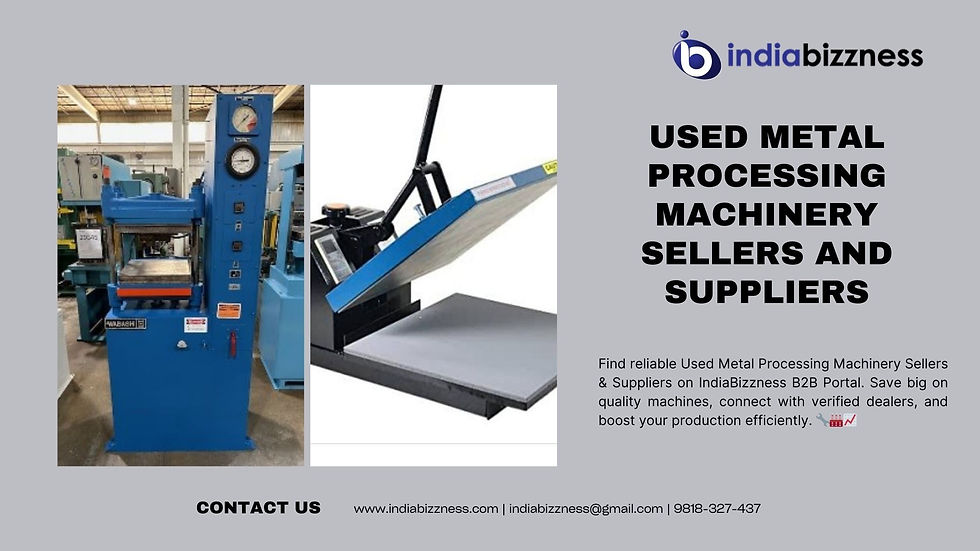The Thriving Market of Used Second Hand Imported Machinery in India
- IndiaBizzness

- Jan 21, 2024
- 4 min read
In the dynamic landscape of industrial growth, the demand for cutting-edge machinery is insatiable. As industries evolve, the need for advanced technology becomes imperative, and businesses often find themselves in pursuit of state-of-the-art equipment. However, the high costs associated with brand new machinery can pose a significant barrier. This is where the market for second-hand imported machinery steps in, offering a cost-effective solution for businesses looking to upgrade their equipment. In this blog, we explore the burgeoning trend of Used Imported Machinery Sale in India, focusing on key sectors such as packaging, plastic processing, and printing.

The Rising Trend of Second-Hand Imported Machinery Sale:
The Indian industrial sector has witnessed a paradigm shift in recent years, with a growing inclination towards second-hand imported machinery. This trend is fueled by the dual benefits of cost-effectiveness and access to advanced technology. As industries expand and diversify, the demand for specialized machinery becomes more pronounced, and businesses are increasingly turning to the second-hand market to meet these needs.
Used Imported Packaging Machines:
Packaging is a critical aspect of product presentation and preservation. The use of advanced packaging machinery can significantly enhance efficiency and quality. The Second-hand imported packaging machines are gaining popularity among businesses looking to upgrade their packaging processes without breaking the bank.
The market offers a diverse range of options, including filling machines, sealing machines, labeling machines, and more. These machines, sourced from reputable international manufacturers, undergo thorough inspections and refurbishments before reaching the buyer. This ensures that businesses can acquire reliable machinery at a fraction of the cost of new equipment.
Used Imported Plastic Processing Machinery:
The plastic industry is a cornerstone of manufacturing, and the demand for efficient plastic processing machinery is incessant. The Used imported plastic processing machinery provides an excellent opportunity for businesses to modernize their operations.
Extruders, injection molding machines, and blow molding machines are among the popular choices in the second-hand market. The advantage lies not only in cost savings but also in the ability to quickly adapt to technological advancements without a substantial upfront investment. This flexibility is crucial for businesses aiming to stay competitive in a rapidly evolving industry.
Used Imported Printing Machinery:
The printing industry has undergone a digital revolution, and businesses are constantly seeking innovative printing solutions. The Second-hand imported printing machinery allows companies to acquire cutting-edge printing technology at a fraction of the original cost.
From offset printing machines to digital printers, the market offers a wide array of options. Importantly, buyers can choose from renowned international brands known for their reliability and performance. This democratization of access to advanced printing technology empowers businesses of all sizes to enhance their printing capabilities.
Benefits of Buying Second Hand Imported Machinery:
Cost-Effectiveness: The primary allure of second-hand imported machinery lies in its cost-effectiveness. Businesses can acquire high-quality equipment at significantly lower prices than buying new. This cost advantage enables companies to allocate resources to other critical areas of their operations.
Access to Advanced Technology: Imported machinery is often synonymous with cutting-edge technology. By opting for second-hand imports, businesses can access advanced features and functionalities that might be financially out of reach when purchasing new equipment. This leap in technological capability can propel a business ahead of its competitors.
Quick Deployment: Time is of the essence in business, and the lead time associated with ordering new machinery can be a significant drawback. Second-hand imported machinery is readily available, allowing businesses to deploy upgraded equipment swiftly. This quick turnaround time is particularly beneficial for industries with rapidly changing demands.
Reliability and Quality Assurance: Reputable sellers of second-hand imported machinery conduct rigorous inspections and refurbishments to ensure the reliability and quality of the equipment. Buyers can have confidence in the performance of the machinery they acquire, backed by the reputation of well-known international manufacturers.
Navigating the Market: Tips for a Successful Purchase
Research and Due Diligence: Before diving into the market, conduct thorough research on the specific machinery you need. Understand the specifications, features, and potential challenges associated with the equipment.
Inspection and Testing: Insist on inspecting the machinery before finalizing the purchase. A comprehensive inspection should cover mechanical, electrical, and software components. Testing the equipment in a real-world setting, if possible, provides assurance of its functionality.
Documentation: Ensure that all relevant documentation, including maintenance records, manuals, and any certifications, is provided by the seller. This documentation is crucial for understanding the history of the machinery and its adherence to safety and quality standards.
The Future of Second-Hand Imported Machinery in India:
As India continues to witness industrial expansion and technological advancements, the market for second-hand imported machinery is poised for sustained growth. This trend is not only beneficial for businesses but also contributes to the circular economy by extending the lifespan of quality equipment.
Government initiatives and industry collaborations can further facilitate the growth of used machinery market by streamlining import processes, ensuring quality standards, and promoting awareness among businesses about the advantages of opting for second-hand imported machinery.
Conclusion:
The market for Second Hand Imported Machinery in India presents a compelling proposition for businesses seeking to upgrade their equipment without the financial burden of purchasing new machinery. From packaging to plastic processing and printing, the availability of reliable and cost-effective imported machinery is transforming the industrial landscape.
By embracing this trend, businesses can not only meet their technological requirements but also position themselves as agile players in their respective industries. As the market continues to evolve, staying informed, conducting thorough due diligence, and making strategic investments in second-hand imported machinery will be key to unlocking the full potential of this thriving sector.




Comments